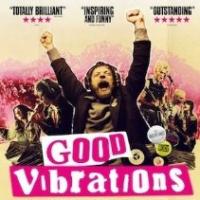
Directed by Lisa Barros D’Sa & Glenn Leyburn
Good Vibrations tells the story of Terri Hooley, the record shop and label he founded in Belfast at the height of the Troubles, and the Northern Ireland punk scene. The film starkly portrays the bleakness of life in Belfast in the 1970s. The vicious sectarian violence of the period is shown in heart-stopping original television clips. One shot in particular, of a shoe lying in the middle of the road after the Miami Showband massacre, will be distressing for anyone who remembers the time.
Social life more or less shut down with the onset of the Troubles as people stayed in their own homes and their own areas. There was a huge growth in illegal drinking clubs in working-class areas but a collapse in the music scene of central Belfast which had been vibrant and alive in the 1960s.
The horror of violence is counter-posed to the energy and enthusiasm of the punk scene. Bands such as Stiff Little Fingers, Rudi, and The Outcasts gave voice to the young working-class people who were most likely to fall victim to paramilitary or state violence, and who lived with poverty and unemployment.
There is no doubt that punk was political, but with a small ‘p’. As Joe Strummer of The Clash explained in 1977, “I think people ought to know that we’re anti-fascist, we’re anti-violence, we’re anti-racist”. The lyrics of the Clash song, White Riot, in the same year are explicit. “All the power’s in the hands of people rich enough to buy it”. In the Northern Ireland context, punk was both anti-state and anti the paramilitaries and the sectarian politicians.
While the story of Terri Hooley is gripping, the back story of his father George is of interest to anyone on the left. George Hooley was a member of the Northern Ireland Labour Party (NILP) and stood as an election candidate in East Belfast on a number of occasions. When the NILP moved sharply to the right in the early 1970s, George worked with members of Militant, the forerunner of the Socialist Party, and many others, in an attempt to rescue the best traditions of the NILP.
At the end of the film George tells his son that, while he may have lost every election he ever fought, his vote went up on each occasion. The previous tension between father and son dissipates as the father acknowledges his son’s achievements, and Terri pays credit to his father’s doggedness in continuing to fly the flag of socialism and anti-sectarianism through bad times and good.
In the film, the struggle of socialist activists is portrayed as being valiant but essentially hopeless. However, the NILP did of course have some success and often won seats in elections, in particular in the industrialised areas of Belfast. It wasn’t always a matter of pushing a boulder uphill.
And what if a vibrant, youthful, mass socialist and anti-sectarian party had existed in the 1970s? Such a party could have mobilised the best working-class activists, the many individuals who stood against sectarianism, and could have harnessed the energy and élan of the young people who rejected the horrors around them to create an alternative future. The same potential exists today.


Be the first to comment